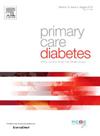生活方式干预对中东地区超重人群维生素 D、脂肪连素、胰岛素样生长因子 1 和神经紧张素的影响。
IF 2.6
4区 医学
Q3 ENDOCRINOLOGY & METABOLISM
引用次数: 0
摘要
背景:与土生土长的瑞典人相比,来自中东地区(ME)的移民患 2 型糖尿病(T2D)的比例更高。与瑞典出生的人相比,中东移民对胰岛素的抵抗力更强,调整后的胰岛素分泌水平(处置指数,DIo)更低。传统的风险因素并不能完全解释这种种族差异。目的:我们的目标是研究随机文化适应性生活方式干预对维生素 D (25(OH)D)、胰岛素样生长因子 1 (IGF-1)、前神经紧张素 (Pro-NT) 和脂肪连素水平的影响。此外,我们还旨在研究干预效果是否与这些激素有关,或者在考虑了这些激素后,干预效果是否仍然是直接的:在这项为期 4 个月的文化适应性随机对照试验中,MEDIM 队列中确定的符合条件的 T2D 高危 ME 移民受邀参加。干预组(35 人)接受了文化适应性生活方式干预计划,包括七节小组课和烹饪课。对照组(32 人)则照常接受口头和书面信息,以改善他们的生活习惯。通过混合模型线性回归分析,我们比较了各组 25(OH)D、IGF-1、脂肪连接蛋白和 Pro-NT 水平的变化,并进一步研究了这些变化对胰岛素作用和分泌的影响:与对照组相比,干预组调整后的 25(OH)D 水平明显提高(干预对 25(OH)D 的影响 β:0.061,95 % CI 0.009-0.113,P = 0.023)。与对照组相比,干预组胰岛素敏感性指数(ISI)的增加在调整 25(OH)D 后发生了变化:0.129,95 % CI -0.016-0.274,P = 0.078)。IGF-1、脂肪连素和Pro-NT对胰岛素分泌随时间的变化没有显著影响:结论:生活方式干预可提高 25(OH)D 的调整水平。此外,在调整 25(OH)D 后,生活方式干预对胰岛素作用和分泌的影响发生了变化。本文章由计算机程序翻译,如有差异,请以英文原文为准。
Impact of lifestyle intervention on vitamin D, Adiponectin, Insulin-like growth factor 1 and Proneurotensin in overweight individuals from the Middle East
Background
Immigrants from the Middle East (ME) have a higher prevalence of type 2 diabetes (T2D) compared to the native-born Swedish population. In individuals free from T2D, ME immigrants are more insulin resistant and have lower levels of adjusted insulin secretion (Disposition index, DIo) compared to Swedish-born individuals. The ethnic differences are not fully explained by traditional risk factors. This has raised the question as to whether hormonal factors other than insulin are involved, contributing to higher T2D risk in ME immigrants.
Aims
In ME immigrants at high risk of developing T2D, we aimed to study the effect of a randomized culturally adapted lifestyle intervention on the levels of Vitamin D (25(OH)D), insulin-like growth factor 1 (IGF-1), Pro-neurotensin (Pro-NT) and Adiponectin. Furthermore, we aimed to study if the effect of the intervention was associated to these hormones, or if a direct effect of the intervention remained after accounting for these.
Methods
In this culturally adapted randomized controlled trial of four months duration, eligible ME immigrants at high risk of developing T2D identified in the MEDIM cohort were invited to participate. The intervention group (N= 35) received a culturally adapted lifestyle intervention program consisting of seven group sessions and cooking classes. The control group (N= 32) were given treatment as usual with oral and written information to improve their lifestyle habits. Using mixed models’ linear regression analysis, the changes in the levels of 25(OH)D, IGF-1, Adiponectin and Pro-NT were assessed by comparing the groups and we further studied the effects of the changes on insulin action and secretion.
Results
The adjusted levels of 25(OH)D significantly increased in the intervention group compared to the control group (β for the effect of the intervention on 25(OH)D: 0.061, 95 % CI 0.009–0.113, P = 0.023). The increase in insulin sensitivity index (ISI) observed in the intervention compared to the control group was altered after adjusting for 25(OH)D: 0.129, 95 % CI −0.016–0.274, P = 0.078). IGF-1, Adiponectin and Pro-NT did not significantly influence the change over time concerning insulin secretion.
Conclusion
Lifestyle intervention increases the adjusted levels of 25(OH)D. Moreover, the effect of the lifestyle intervention on insulin action and secretion was altered when adjusting for 25(OH)D.
求助全文
通过发布文献求助,成功后即可免费获取论文全文。
去求助
来源期刊

Primary Care Diabetes
ENDOCRINOLOGY & METABOLISM-PRIMARY HEALTH CARE
CiteScore
5.00
自引率
3.40%
发文量
134
审稿时长
47 days
期刊介绍:
The journal publishes original research articles and high quality reviews in the fields of clinical care, diabetes education, nutrition, health services, psychosocial research and epidemiology and other areas as far as is relevant for diabetology in a primary-care setting. The purpose of the journal is to encourage interdisciplinary research and discussion between all those who are involved in primary diabetes care on an international level. The Journal also publishes news and articles concerning the policies and activities of Primary Care Diabetes Europe and reflects the society''s aim of improving the care for people with diabetes mellitus within the primary-care setting.
 求助内容:
求助内容: 应助结果提醒方式:
应助结果提醒方式:


